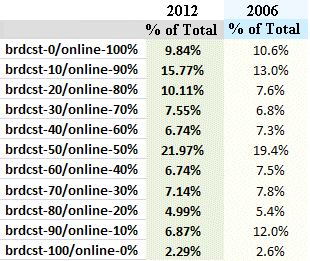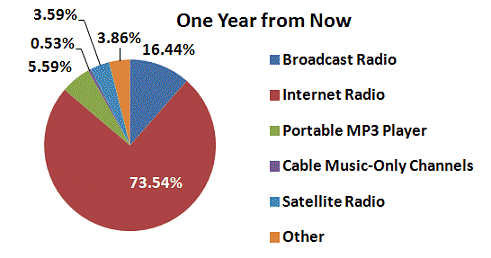 Analytics, Metrics and Music for the Radio Industry
Analytics, Metrics and Music for the Radio Industry
 Advertising and Indie Artists for Radio
Advertising and Indie Artists for Radio
 Radio Industry ROI Strategy
Radio Industry ROI Strategy
 How the internet affects radio advertising and music airplay.
How the internet affects radio advertising and music airplay.
The Changing Face of Radio's Ears
There are more than a couple of items to discuss today. We'll hold things to the two most important. 1) Anyone with radio DNA is in awe of Dick Clark's contributions to multiple entertainment industries. I join all who mourn his passing; 2) Online radio is making more news and, for the radio industry, it's not the kind you will read about in trade mags.
The headway gained by internet radio is starting to resemble a NASCAR driver pulling ahead - with the pack not sure if it needs to dip low and slow on the next curve or increase speed (with the possibility of calamity).
The most recent case of how internet radio is eating into the budget of the broadcast radio industry comes from Coca-Cola. It's "partnered" with Spotify in a "global initiative," and promises to "advertise Spotify globally via paid media and product packaging." Other app deals being worked by Spotify are with McDonald's, AT&T, Intel, and Reebook.
| "If you are in the broadcast radio industry, your choice is to shrug off this data or start implementing moves to counter the prediction." | Spotify is not the only online radio company teaming with corporations, either. Pandora is "teaming" with many auto makers and getting the "P" in major ad campaigns. Microsoft and LastFM are getting together with an Explorer 9 web app. Slacker announces an integration with Bing. And, Live365 (the Rodney Dangerfield of internet radio) long ago teamed with Oprah Winfrey's Harpo Radio and multiple major artists who have branded their own stations. Examples are the Atlanta Symphony, Pat Metheny, and Carlos Santana. (My words to you: do not underestimate the power of Live365.) |
The common thread through all of these deals is that the broadcast radio industry is being left behind, for a reason. Change is all around. It's not the kind that will kill broadcast radio but it is going to have a profound impact on how traditional stations do business in the not-too-distant future.
I have a couple of stats to share which come from the current Audio Graphics internet radio listener survey; as the only continuously running survey of this growing group, it's important for the radio industry to pay attention to what's being said. From the deals spoken of above, it seems advertisers are.
First, though, a sentence on how Google is revamping its audience analytics to offer an "alternative way of measuring the audience for online media by implementing metrics similar to those used in television." We not only have those who listen to radio changing patterns, there's also a movement for delivering to advertisers more familiar ways of packaging audience numbers. As with most everything reported at Audio Graphics, this comes with the warning of "ignore at your own risk."
The Media Auditís Phillip Beswick was quoted at the NAB/RAB as stating, "10% of people don't listen to broadcast radio." To add credence to what follows, I will state that 9.84% of internet radio listeners responding to AG's latest survey report they don't listen to broadcast radio either. Now that I've got your attention, here are a few more facts.
In our current survey of internet radio's audience Audio Graphics asked the following, the same question posed in 2006: "If you label your TOTAL radio listening, what percentage of time do you spend with broadcast radio? What percentage with radio online?"

With the exception of listening to broadcast radio 40% of the time, and internet radio 60% of the time, all other categories show interest in online radio increasing. Notice how listening to broadcast 90% and internet radio 10% has a dramatic 5.1% drop. More people are spending less time with the traditional radio industry.
Tracking what is being done and asking the radio listener's opinion of what they will do a year from now also offers some intriguing stats: "By this time next year, what do you see yourself listening to most?"

If you are in the broadcast radio industry, your choice is to shrug off this data or start implementing moves to counter predictions.
From my perch there doesn't appear to be enough being done to counter. I continue to hear a repeated refrain: "Radio delivers local content that can't be duplicated online." It's a tired phrase that's not true anymore.
From all of the above, draw your own conclusion. My hope is that you see the dichotomy between what is happening in the radio industry and the rise - and staying power - of an iconic figure like Dick Clark.
Dick did not sit on old ways. He changed everything that came in contact with him, constantly changing the lives of every one of his fans, artists he worked with, and advertisers.
As an industry, radio hasn't changed much in the past 60 years. It certainly has not offered advertiser anything different in approach to messaging, or in accountability of message delivered. That action is what the companies mentioned (at the start of this discussion) also have in common.
Until/unless broadcasters stop defending where they've been, and begin charting new courses for what's ahead, there will be no change in these stats - except in favor of the internet.
Each set of ears that's listening to radio is attached to a face and mind that's changing daily. The radio industry needs to follow this lead, or dip low and continue to slow. There's really no other option left.








